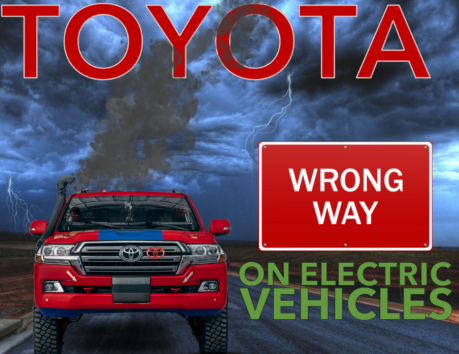The Truth Behind Toyota’s Super Bowl Ad
By East Peterson-Trujillo

The Super Bowl is the biggest night of the year for advertising. After skipping the event in 2022, Toyota spent $7 million on Sunday to sell the latest version of its pickup truck. The ad was conspicuously out of place at a time when unprecedented amounts of planning, along with subsidies and infrastructure, are being poured into electric vehicles, setting the stage for an EV revolution. The Toyota pickup barely scrapes over 25 mpg on the highway . But advertising another gas guzzler must seem like an obvious choice for a company having little interest in going emissions free—like Toyota.
Across the company’s advertising, Toyota is rebranding its dated, gas-powered hybrid vehicles as “electrified,” capitalizing on the popularity of electric vehicles (EVs) even though hybrids are a far cry from being electric. At the end of 2023, Public Citizen filed a complaint with the Federal Trade Commission (FTC) and several state attorneys general asking them to investigate misleading and harmful Toyota marketing that portrays gas-powered hybrids as EVs.
This is a disappointing turn from Toyota, which once led the auto industry in green technology when it launched the Prius in the U.S. in 2000. Toyota is now at the back of the pack, while its competitors make the cars of the future. General Motors (GM)—Toyota’s main competitor in the U.S. market—has committed to selling only zero-emission vehicles by 2035; Volvo is aiming for 50% EV sales by 2025 and 100% by 2030. Tesla, of course, is already 100% electric and it delivered 1.8 million EVs to global consumers in 2023.
Despite consumer demand—fifty-five percent of global car buyers intend to purchase an EV as their next vehicle—Chairman and former CEO Akio Toyoda predicted last month that EVs will only reach 30% of market share. We’ll likely pass that number in just a few years. For months, Chairman Toyoda has contradicted current CEO Koji Sato in media appearances, sparking questions about the company’s true plans on electric vehicles, and questions about who is actually in charge.
A 2023 report found that Toyota models were most likely to be traded in by consumers choosing to purchase an EV. This shouldn’t be a surprise: though Toyota claims it has the “widest selection” of low- and zero-emission vehicles on the market, it offers only one EV, fewer than most major U.S. automakers. Last year, 1.2 million EVs were sold in the U.S. and fourth quarter EV sales increased by 40% year over year from 2022. Toyota sold just 9,329 EVs.
Competitors continue to pass Toyota in sales and production. In 2023, Toyota and Lexus marketed 21 models under the company’s “electrified” label. Three were plug-in hybrids and only one was a battery electric vehicle, the bZ4X, which accounted for those 9,000 EV sales. To put it in perspective, GM sold 75,883 all-electric units in the U.S. in 2023. Volvo sold 113,419 fully electric cars globally, marking a 70% increase in sales and making up 16% of its total global sales volume. And Tesla is still topping the charts with over 1.8 million EVs delivered in the U.S. in 2023. Toyota is simply not measuring up.
For many consumers who are looking to buy an EV, the choice is an environmental one, and the reality is that the bulk of Toyota’s “electrified” line-up runs on the same gas-powered technology as any other internal combustion vehicle. Consumers typically understand “electric vehicles” to refer to cars that are fully, or at least meaningfully, electric—and therefore materially superior to hybrids regarding climate impacts, cost of ownership and maintenance, and other factors. Hybrids’ modestly reduced emissions are still significant, and climate scientists have made it clear we need to eliminate nearly all emissions as fast as possible.
By refusing to transition to electric vehicles and passing off gas-powered hybrids as “electrified,” Toyota is taking customer loyalty for granted. The four in ten U.S. consumers looking to purchase an EV as their next vehicle won’t be duped by Toyota’s fancy marketing. If Toyota doesn’t want to get left in the dust, the company must meet this moment and innovate for the zero-emission vehicle future.
East Peterson-Trujillo is the Senior Clean Vehicles Campaigner at Public Citizen and a strong advocate for electric vehicles and clean car standards.